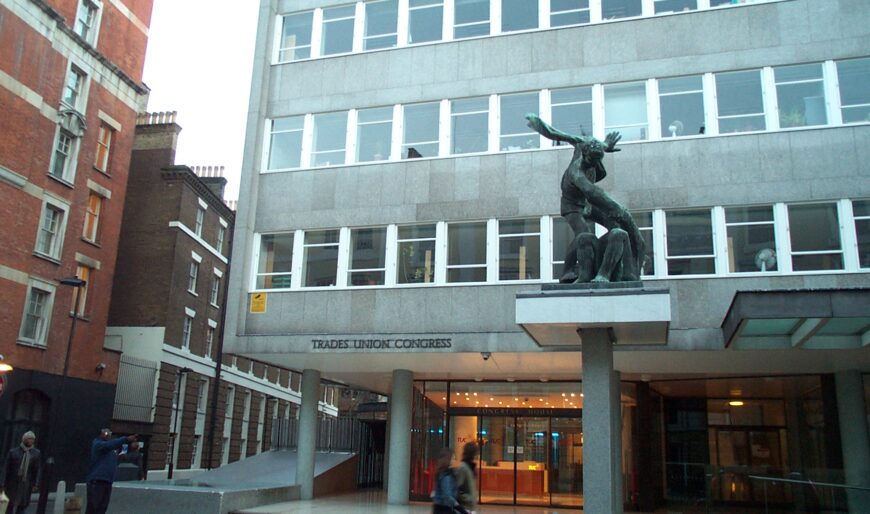Consultation on creating a modern framework for industrial relations
TUC response to 'Making Work Pay'

The TUC warmly welcome this consultation on creating a modern framework for industrial relations and appreciate the opportunity to respond.
A principles-based approach
Question 1 – Do you agree or disagree that these principles should underpin a modern industrial relations framework? Is there anything else that needs consideration in the design of this framework?
The TUC is supportive of establishing principles to guide and promote a positive industrial relations framework that delivers a meaningful voice for workers in the workplace and secures their ability to gain a fair share of the fruits of their labour.
With a few suggested textual amendments, we support the principles of collaboration, proportionality, accountability and balancing the interests of workers, businesses and the wider public. We do, however, believe that these are incomplete, as they do not mention collective bargaining. The principles should be expanded to include reference to collective bargaining, because without collective voice within the workplace the other aims are not realisable. At the moment, the principles do not explicitly recognise this.
As the principles imply, relationships between employers and trade unions are key, but unfortunately many workers in the private sector are currently not collectively represented by unions. Without union representation and collective voice, the imbalance of power between an individual worker and their employer is too great to make a balance between the interests of workers, businesses and the wider public possible, or to fully enable meaningful collaboration, proportionality and accountability. Promoting and extending collective bargaining so that workers can speak collectively with one voice, and anonymously if necessary, through their trade union, is an essential component of creating a fair and sustainable industrial relations system and should be explicitly included as a guiding principle.
The UK’s industrial relations framework should also reflect and promote international standards to which the UK is a signatory, and in particular the ILO Conventions and Principles, required to be upheld by all ILO members. ‘Freedom of association and the effective recognition of the right to collective bargaining’ is the first ILO Principle, underlining the case for including promoting and extending collective bargaining within the guiding principles designed to govern UK industrial relations.
Collective bargaining coverage across the UK has declined from over 70 per cent in 1979 to under 40 per cent today, and is just 21 per cent in the private sector[1]. The decline of collective bargaining coverage has directly contributed to stagnation in wages, growing inequality and weak economic performance in the UK economy[2]. As the OECD has concluded, “Collective bargaining, providing that it has a wide coverage and is well co-ordinated, fosters good labour market performance.”[3] Recognition of the role of collective bargaining as an underlying policy objective that can support growth and reduce inequality would be welcome.
In July 2022, the European Commission acknowledged that “countries with high collective bargaining coverage tend to have a lower share of low-wage workers, lower wage inequality and higher wages.” The Commission has recently established an objective that asks Member States where the collective bargaining coverage is less than 80% to establish an action plan to promote collective bargaining.[4] It would be welcome if the UK government set a similar goal for collective bargaining coverage of at least 80%, with a timeline for achieving this.
In addition, the right of workers to have some say over decisions that affect them at work is an essential principle of positive industrial relations. This could be incorporated into a new principle on collective bargaining or could be incorporated within existing principle 3 on accountability.
We also suggest the following minor textual amendments:
- In line 2 of collaboration, replace ‘employees’ with ‘workers’ or ‘workforce’ to clearly include all workers, not just those who are directly employed (and reflecting the wording elsewhere in the principles).
- In the final line of proportionality, add ‘negotiation’ after ‘engagement’ (or replace engagement with negotiation), as negotiation is the core role of trade unions in the workplace.
Question 2 – How can we ensure that the new framework balances interests of workers, business and public?
The TUC would argue that in many instances there is a convergence between the long-term interests of workers, business and the public. Businesses succeed best with a secure, motivated and confident workforce and the public interest is served through businesses and public services that are delivered by workers who are well trained, fairly paid and fully engaged in their work.
However, there is a high road and also unfortunately a low road to short-term success. In recent years, the industrial relations and labour market policy of the UK has at least facilitated and arguably encouraged businesses to take a low road approach to business and employment models. The government is rightly aiming to address this through strengthening the floor of individual employment rights and the framework for collective rights. We believe that a significant strengthening of both is needed to facilitate the creation of business and employment models that deliver for workers, businesses and the public.
In addition, the priority given to the interests of shareholders within the UK’s corporate governance system can encourage businesses to take a short-term approach to decision-making and lead to business models based on insecure, low-paid work. Reform of corporate governance to require company directors to promote the long-term success of the company as their primary aim and to ensure all companies with 250 or more staff include elected worker directors on their boards would encourage the development of businesses models based on decent work. This would support the government’s programme of much-needed employment rights reform by creating an institutional environment where employment reform is going with, rather than against, the grain of business models.
Unfair practices during the trade union recognition process
Question 3 – Do you agree or disagree with the proposal to extend the code of practice on access and unfair practices during recognition and derecognition ballots to cover the entire recognition process from the point when the CAC accepts the union’s application for statutory recognition? Please explain your reasoning and provide any evidence on cases that support your view.
The TUC strongly supports the proposal to extend the code of practice on access and unfair practices during recognition and derecognition ballots (henceforth code of practice on access and unfair practices) to cover the entire recognition process.
While many employers respond to a request from a union for recognition and access in a constructive and pragmatic manner, there are others who take a hostile and destructive approach to unions’ attempts to organise. This stymies the ability of workers to have a meaningful choice over their right to join a union and to have that union recognised for collective bargaining. Union representatives experience a wide range of employer actions, sometimes aggressive, that are designed to frustrate unions speaking to workers.
Employer responses to union representatives leafleting or speaking to workers outside work premises include:
- ordering the union away, even if on public ground
- calling the police
- monitoring and intimidating union reps and workers with the use of drones
- ensuring that workers leave by another door
- telling workers not to speak to the unions or take any materials
- watching to see who talks to the union/takes leaflets etc and then putting pressure on those workers, sometimes in one-to-one meetings, not to join or engage with the union.
At the moment, unions gain some access to workers once a statutory recognition ballot has been ordered by the CAC, but not before. This means that a hostile employer can use the time before that point is reached to put its view across to the workforce without the union being able to do so, creating an incentive for the employer to delay reaching agreement with the union on access to support a recognition campaign. This creates an imbalance between employer and union opportunities to engage with and influence the workforce, which goes against the principle of equal access that runs through the code of practice on access and unfair practices.
Unscrupulous employers may use this period before a union gains access to begin maneouvring to avoid recognition, including engaging union busting companies and signing sweetheart deals with non-independent unions.
Giving unions access rights from the start of the recognition process is vital to make the statutory recognition system fairer and ensure workers have the opportunity to hear from unions as well as their employer throughout the whole process. This would be a significant improvement on the current framework.
There is, however, a question of how the start of the recognition process should be defined. As the first step of the recognition process is for the union to write to the employer to see if the employer will recognise the union voluntarily, it would make sense for the code of practice on access and unfair practices to apply from this point. Otherwise, there will still be a period during which the employer may deny access to the union and engage in unfair practices designed to influence the workforce against unionisation.
To read the rest of the TUC response to Making Work Pay, please see:
https://www.tuc.org.uk/research-analysis/reports/consultation-creating-modern-framework-industrial-relations







